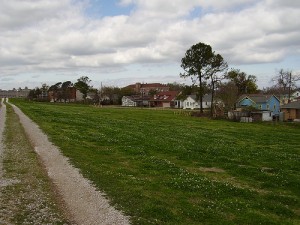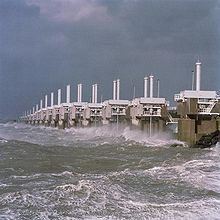Burdens: Who really cares about part 3 anyway?
I heard a story the other day about a family that had lived here for generations. All of them – every cousin, every aunt, every niece and grandchild and son and daughter. When Katrina came, they had nowhere to go, because everyone they knew was here. Could you afford to pick up and move to a hotel for a week? How about for ten months? How about forever? I think this family took buses to stay in shelters in Houston. They never did come back. The oldest generation moved to Arizona, taking pretty much nothing with them, using retirement money to furnish their new house from scratch. Their son took his wife and children to Minnesota. Another son and his family live in Texas. The third grown son moved to Baton Rouge. I think that’s a little sad. The grandkids don’t know their grandparents now, will never know them in the way they could have if they’d all stayed here. They don’t know their cousins. The siblings all lost their whole support network, and each were forced to strike out on their own in a new place. They scattered, foraging for jobs and landing where they found them, and it’s a pity that they felt they had to, in my estimation.
Right after we found out The Professor got the job, I read this De@r Pruden(e column on Sl@te. (can I get a shout out for being addicted to advice columns? Anybody with me?). One of the letters was from a woman who said “All the people who suffered in Hurricane Katrina deserved it because it was their dumb choice to live in that city in the first place.” This is an argument I’ve heard before, though not put quite so bluntly. I’ve never given it much heed, but it stung more deeply this time because if Hurricane Suzanne or Finkelstein or Marty comes along in a few years and knocks out the city again, this time it’ll be me she’s talking about. So I have a few thoughts on why this place exists, and should continue to exist:
1. This is a major, MAJOR port. From the Port of New Orleans website:
The Port of New Orleans is at the center of the world’s busiest port complex – Louisiana’s Lower Mississippi River. Its proximity to the American Midwest via a 14,500-mile inland waterway system, six Class One railroads and the interstate highway system makes New Orleans the port of choice for the movement of cargoes such as steel, rubber, coffee, containers and manufactured goods.
Anybody up there in the midwest got any manufactured goods? You like ’em?
2. Ports tend to exist in areas prone to flooding, for obvious reasons. People who work to support the ports – like stevedores, seamen, river pilots, shipping warehouse workers, dock equipment operators, etc. – have to live here.
3. Look at these pictures.


I’m being a little unfair, here, of course, because The Netherlands (also under sea level!) is a country full of earthen levees as well. I am no engineer. I don’t mean to disparage earthen levees as a flood control device, nor do I want to tell the engineers here how to do their jobs. However. Look at this storm surge dam that the Netherlands put in place after they suffered huge losses in a flood. This is some serious technology. We have nothing like this here. The Army Corps of Engineers has failed to impress this non-engineer layperson taxpayer with any similar display of awesome technology. Our pumping stations can’t keep up if it rains hard for more than a couple hours. There are mechanisms out there to provide greater protection for this port city, and they aren’t being implemented. Insert your own reasons why – lord knows there are a million conspiracy theories – but the fact remains, this vital port city could be better protected by some investment of dollars and brainpower.
4. If you’ve never been here, you should come. You’ll see, very quickly, that this city is a jewel. It is unique, vibrant, historic, and important. It is extremely troubled, by many things. It is violent, the city government has trouble with corruption and misappropriation of funds, taxes are high with a low return, the streets are ridiculously broken apart and potholed, if your car has a low clearance you have to find some higher ground on which to park it if it rains for an hour or more (about 5 law school friends’ cars were totaled last semester during a particularly hard rain, when the water came up to seat level in their cars which they carelessly left parked on the main street), half the street signs are missing with no hope of replacement in the near future, and there is a general air that the place is being run by a bunch of teenagers. The Times Picayune has a section (Pothole Patrol) where readers submit pictures of the worst potholes (more like crevasses opening up into the sandy soil below), the better to shame the city into fixing them. You learn, living here for a while, not to expect any agency to run like it should, nor to expect anyone to be particularly upset about it. Despite all of these flaws, New Orleans regularly rises to the level of sublime. Our neighborhood is unspeakably lovely. The parks are terrific. The live music and the food are world famous. The streetcars, the gas lights, the Garden District homes, the churches, the French Quarter, Magazine Street, the riverside . . . I wish I could explain it. I’ve lived a lot of places, and there really is just no place in the world like this city. It is worth keeping dry, even aside from its value as a port. It is worth saving.
I wanted to do a little more research, write a more coherent post about this, but man I am researching FIVE papers this term and I just don’t have the time. So these preliminary blurted out thoughts will have to do. Barring some kind of natural disaster (heh heh. Er, I suppose that isn’t entirely out of the realm of possible, now is it?), we will be Gulf Coasters now. Our homeowner’s insurance will be higher, we’ll have to be prepared to evacuate at any time during hurricane season, we’ll have to live with the knowledge that all our worldly goods may be destroyed in a storm at any time. But this is where the job is. This is where our work is. And I hope if we do end up unlucky one year, that people will have more compassion and understanding for why we’re here, and why we’d probably come back. I hope they’d at least try to see why this place continues to be, despite the geographical difficulties of keeping it dry, and why it isn’t so easy for the people who live here to just abandon their property and their jobs and their lives, and leave it all behind. I’m glad they never have. I’m glad to be here.

3 Comments
CM
That ridiculous letter was the first thing I thought of when I read the beginning of your post. I found it hilarious that this came out in SUNDAY SCHOOL. Of all the hypocritical statements…
I know you said the Professor found a great job — but it’s local too? That’s amazing!
Jennifer
I loved your series! You should do more. This post really resonated with me. I’m definitely in a place of ‘choice’, and how we (as individuals, couples, families, communities, countries, etc…) make those choices. For better or worse, we choose something, even if we choose passivity- that’s still a choice. I love your relationship to your physical community and how to be there is a choice, and it comes with big ups, and sizable downs. And the same would exist anywhere. I know it’s not even MY life, but I’ve been smiling all week for you. Knowing that you and the Prof and the boys have a bright bright future, maybe even a future where your lust after house porn will become a reality instead of a fantasy 🙂
PRW
Congrats on your decision to stay in New Orleans, and big congrats to the Prof. on the job. I say as long as you understand and accept the risks and plan accordingly, enjoy! (An apropos motto, to be sure – “be prepared.”) I love places with a rich heritage and history. Out West we have a different heritage, mostly of cattle ranching and generally destroying indigenous peoples.